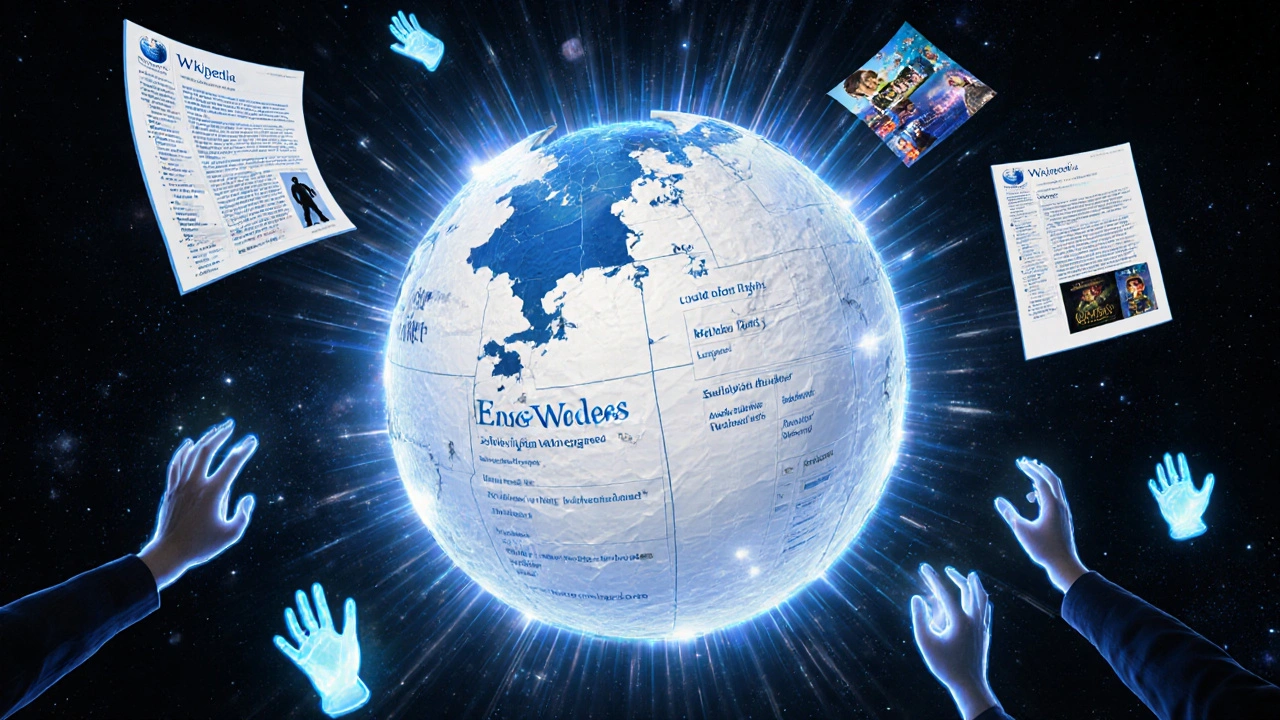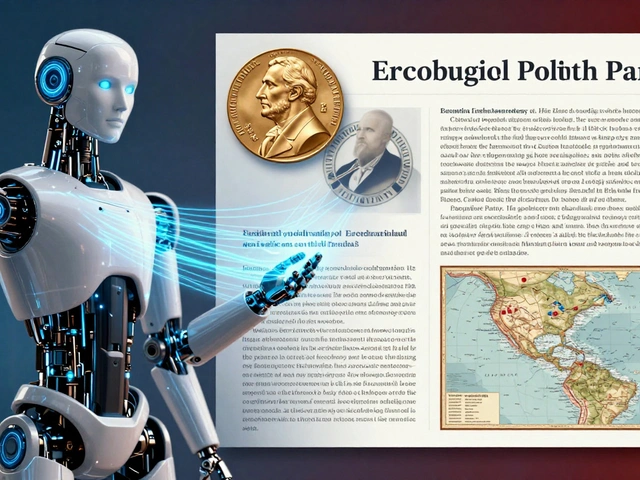
Wikipedia doesn’t just record facts-it reflects what people care about. And right now, fantasy and science fiction franchises are dominating the site’s most-viewed pages. Not because academics wrote them, but because fans keep clicking, editing, and sharing. From Lord of the Rings to Star Wars, these worlds live on Wikipedia not as static entries, but as living, breathing communities.
Why These Franchises Dominate Wikipedia
Think about it: when was the last time you Googled the plot of Game of Thrones? Chances are, you landed on Wikipedia. That’s not an accident. Fan communities treat Wikipedia like a shared wiki-part encyclopedia, part fan wiki, part trivia hub. Unlike official sites that update slowly or lock content behind paywalls, Wikipedia lets anyone add lore, character bios, or episode summaries the moment they’re released.
Franchises like Harry Potter and Dune get millions of views every month-not because they’re trending on Twitter, but because fans keep updating them. A new movie drops? Within hours, someone adds the cast list, box office numbers, and even fan theories about hidden symbols. These aren’t just edits-they’re acts of devotion.
How Fandom Shapes Content
Wikipedia’s rules say you need reliable sources. But fandom finds creative ways around that. Take Marvel Cinematic Universe pages. Official press releases are sparse. So fans rely on interviews, behind-the-scenes documentaries, and even credible fan sites like Marvel.com or ComicBook.com as sources. They don’t break the rules-they stretch them.
Compare that to a lesser-known fantasy novel. If it doesn’t have a movie deal or a Netflix series, its Wikipedia page might sit untouched for years. But a franchise like The Witcher? After the Netflix show dropped in 2019, its page traffic jumped 400%. Fans didn’t just read-they rewrote entire sections, adding new characters, timelines, and even language translations from the original Polish books.
This isn’t vandalism. It’s curation. Fandom-driven editing often improves accuracy. One study from the University of Michigan found that pages edited by active fan communities had fewer factual errors than those maintained by casual editors. Why? Because fans care deeply about consistency. They notice when a character’s birth year changes between seasons. They fix it.
The Data Doesn’t Lie
Wikipedia’s public traffic stats show clear patterns. Between January and October 2025, the top 10 most-viewed fantasy and sci-fi pages were all franchises with active media releases. Here’s what topped the list:
- Star Wars - 28 million views
- Lord of the Rings - 21 million views
- Harry Potter - 19 million views
- Marvel Cinematic Universe - 17 million views
- Star Trek - 14 million views
Compare that to Game of Thrones, which still pulls 12 million views despite ending in 2019. That’s more than most current TV shows. And it’s not just the main pages-spin-offs like House of the Dragon and The Rings of Power get millions too. Each new episode triggers a spike in edits and views.
Even older franchises like Dune saw a 300% traffic increase after the 2021 film. Fans didn’t just rewatch-they rewrote the entire lore section to match the new movie’s canon, cross-referencing with Frank Herbert’s original novels.

Why Other Franchises Get Left Behind
Not every fantasy or sci-fi series gets this love. Take His Dark Materials. It has a solid HBO series and loyal fans, but its Wikipedia page only gets about 1.2 million views per month. Why? Because it lacks a massive, global fanbase with the resources to maintain it. Most of its edits come from three people. No one’s adding new episode summaries. No one’s updating character timelines after the show’s cancellation.
Same with The Expanse. It’s critically acclaimed. But without a big studio backing it or a blockbuster movie, its page stays quiet. Fans care-but they’re scattered. They don’t have the critical mass to keep the page alive.
It’s not about quality. It’s about scale. Franchises that hit mainstream culture get the attention. And Wikipedia reflects that.
The Role of Media Releases
Every new season, movie, or game launch acts like a spark. When Avatar: The Way of Water came out in December 2022, its Wikipedia page got 8 million views in the first week. Fans added new characters, updated the plot summary, and even corrected the spelling of Na’vi names.
But the spike doesn’t fade. It becomes part of the page’s DNA. Months later, people still search for it. The page doesn’t just report on the movie-it preserves the cultural moment. That’s why Avatar still ranks in the top 20 sci-fi pages in 2025, even though the sequel’s theatrical run ended.
Franchises that release content consistently-like Doctor Who or Star Trek-have pages that grow over decades. They’re not static. They’re archives. Each generation of fans adds to them. New viewers find them. Old fans return. It’s a feedback loop.

What This Means for Wikipedia
Wikipedia’s editors aren’t neutral archivists anymore. They’re part of a global fandom ecosystem. The site has become the default hub for pop culture knowledge. That’s both a strength and a risk.
On one hand, it’s the most comprehensive, up-to-date source for these franchises. On the other, it’s vulnerable to bias. Fan theories sometimes get presented as fact. Retcons get buried under newer versions. And when a franchise splits into competing canons-like Star Wars’ Legends vs. Disney canon-edit wars break out.
But here’s the thing: those fights happen because people care. They’re not deleting pages. They’re fighting to preserve them. That’s why Wikipedia survives as the go-to source for fantasy and sci-fi lore, even when official sites are outdated or paywalled.
What’s Next?
As AI-generated content floods the web, Wikipedia’s human-driven model stands out. No algorithm can match the depth of a fan who’s read every novel, watched every episode, and memorized every line of dialogue. That’s why these pages keep growing.
Upcoming franchises like Shadow and Bone Season 3 and The Last of Us Season 2 will likely see the same pattern: a surge in views, a flood of edits, and a new layer of lore added to the page. The cycle will repeat.
Wikipedia doesn’t predict trends. It records them. And right now, the biggest trend isn’t technology, politics, or science-it’s the enduring power of fantasy and sci-fi worlds, kept alive by the people who love them most.
Why do fantasy and sci-fi pages get more views than other topics on Wikipedia?
Fantasy and sci-fi franchises have massive, active fanbases that constantly update Wikipedia pages with new details after every movie, show, or game release. These fans treat the pages as living documents, adding lore, character bios, and episode summaries in real time. Unlike topics like history or science, which rely on academic sources, these pages thrive on community engagement and media-driven updates.
Do fan edits on Wikipedia make these pages less reliable?
Not necessarily. While fan edits can introduce bias, studies show that active fan communities often improve accuracy because they’re deeply invested in consistency. For example, fans of Star Wars or Harry Potter catch errors in character timelines or plot details faster than casual editors. Wikipedia’s moderation system still requires reliable sources, so most edits are backed by interviews, official sites, or published books.
Why do some franchises have much higher Wikipedia traffic than others?
It comes down to scale and media presence. Franchises with big studio backing, global releases, and multiple media formats-like Marvel Cinematic Universe or Star Wars-have millions of fans who actively edit and visit their pages. Smaller franchises, even if critically praised, lack the critical mass to sustain high traffic. For example, The Expanse has a loyal following but far fewer views than Game of Thrones.
Can Wikipedia pages for fantasy/sci-fi franchises become outdated?
Yes, but only if the fanbase fades. Franchises like Doctor Who or Star Trek have been updated for over 50 years because new generations of fans keep adding content. But if a series ends without a strong fanbase-like His Dark Materials after its cancellation-the page can stagnate. Without regular edits, outdated information remains, and traffic drops.
How do new releases affect Wikipedia traffic for these franchises?
New releases cause immediate spikes. When Avatar: The Way of Water came out, its Wikipedia page got 8 million views in one week. Fans rush to update cast lists, plot summaries, and even language translations. These spikes often stick around-pages for older films like Lord of the Rings still get millions of views yearly because new viewers discover them through streaming or re-releases.




